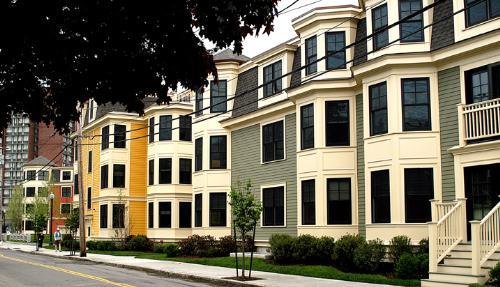
News
Summers Will Not Finish Semester of Teaching as Harvard Investigates Epstein Ties

News
Harvard College Students Report Favoring Divestment from Israel in HUA Survey

News
‘He Should Resign’: Harvard Undergrads Take Hard Line Against Summers Over Epstein Scandal

News
Harvard To Launch New Investigation Into Epstein’s Ties to Summers, Other University Affiliates

News
Harvard Students To Vote on Divestment From Israel in Inaugural HUA Election Survey
New Emergency Assistance Family Shelter To Open In Cambridgeport

Massachusetts will open a new “Rapid Track” shelter for up to 70 Emergency Assistance eligible families in Cambridgeport beginning at the end of April.
The facility, which is nearly ready to open, will fill the gap left by the closure of an overflow shelter in East Cambridge that was part of a larger response to pressure on the state’s emergency housing system. Described as “rapid track,” it is part of a network of shelters for families who the state considers likely to find permanent housing within a month, given support from state-provided case managers.
The new shelter will be located at Sidney Street near the border of Kendall Square in what used to be a vacant office building.
The state will hire 24-hour private security for the site, with support from local police who patrol the East Cambridge neighborhood. According to the city, that security plan will “ensure that the neighborhood will be safe from those attending the family shelter” and “minimize any potential impact or disruption to the immediate neighborhood.”
The new “rapid track” program, which began in December 2024, represents a transition in the overflow shelter system that was created in response to a heavy strain on the state’s supply of emergency housing beginning in late 2022.
Massachusetts law requires the state to provide shelter to unhoused families and pregnant women who meet certain eligibility criteria. But when the state found itself unable to meet a spike in demand due in part to a surge in new immigrant arrivals to the state, it was forced to open new, impromptu overflow shelters in cities across Massachusetts in 2023, including at Cambridge’s current Registry of Deeds.
The state also added several new restrictions to its right-to-shelter law, including limits on how long families can stay and who is eligible, which have brought down pressure on the system, even as advocates have decried the changes as the end of the guarantee to the right to shelter.
Still, the imposition of a 7,500-family cap on the Emergency Assistance program by Governor Maura T. Healey ’92 left families in need of shelter on a waitlist for housing, leaving some demand still unmet.
Since then, the overflow shelters opened in 2023, called Temporary Respite Centers, have largely closed — including the one at the Cambridge Registry of Deeds — or transitioned into a new model.
The opening of the new Cambridgeport rapid-track shelter, set for the end of the month, seems to indicate that the state is absorbing that “rapid-track” framework into its permanent emergency housing system.
The State did not respond to requests for comment on how long it plans to keep the new shelter in Cambridge open.
Families at rapid-track emergency assistance shelters across Massachusetts are allowed to stay up to 30 business days, and are provided meals, “basic necessities,” and “intensive case management services,” according to the city’s press release.
Despite opening a month before the planned closure of the Transition Wellness Center, another shelter in Cambridge, the Sidney Street shelter will not act as a replacement — even as advocates press to keep the former one open. The TWC serves individuals only, not families, and is funded by the city, not the state.
“I am glad homeless families are getting some support and getting some assistance,” said Jim Stewart, the director of the privately-run shelter in the city. But Stewart warned that demand for emergency beds remains elevated in the city for individuals, who will soon see supply drop with the closure of the TWC.
“There’s approximately 89 people on a waiting list just for the beds down at 240 Albany St.,” Stewart said.
— Staff writer Diego García Moreno can be reached at diego.garciamoreno@thecrimson.com.
— Staff Writer Summer E. Rose can be reached at summer.rose@thecrimson.com.
Want to keep up with breaking news? Subscribe to our email newsletter.
